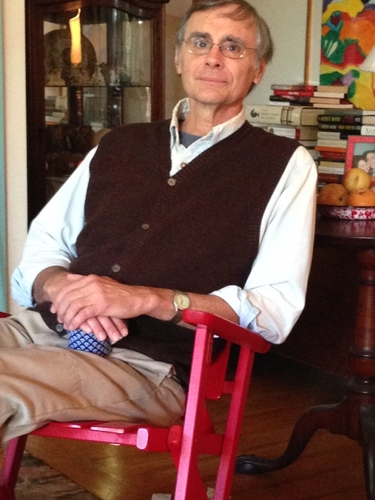NEWFANE — “Coffee?” author Castle Freeman Jr. asks as Freddie the dachshund yaps a happy greeting.
The old farm house the author shares with his wife Alice bursts with splashes of bright color. The art hanging on the wall, plates displayed above the kitchen window overlooking the back garden, books stacked by reading chairs, a hanging mobile near a doorway.
The large grey wood-burning cook stove is the kitchen's most subdued item.
“Alice is an artist,” Freeman says. “Color is her whole life.”
Freeman settles in the couple's living room. He rocks back in a primary red rocking chair. He turns the bright blue mug in his hands as he ponders a question.
The Devil in the Valley, the author's sixth novel, due in bookstores soon, is sparse on description, deep in dialogue, and very much small-community Vermont.
“I like to give the reader the sense of what it would be like to experience a place,” he says.
But, Freeman adds, he likes to create this feeling indirectly through dialog rather than overtly through description.
“I try to suggest everything,” he says.
He finds it satisfying when he succeeds at creating a world mostly through the character's voices.
“I try to give everybody his own little accent,” Freeman said.
In Devil, unbeknownst to main character Langdon Taft, there are more supernatural forces at work in the very down-to-earth Vermont community than he ever noticed.
Taft, “ex-teacher, ex-scholar, ex-abstainer,” agrees to sell his soul to Dangerfield, Lucifer's best closer, who has an outfit for every occasion.
The whole idea of someone selling one's soul for a gift captures Freeman's interest.
“It's a great joke life plays on us,” Freeman said. “When we've got it all figured out, we die.”
Taft starts the novel lost - or, rather, more like drifting in place. A deal with the devil is as interesting as anything and a good way to get new tires for his truck.
Dangerfield gets more than he bargained for with Taft.
Taft and fellow community-member Calpurnia - a sassy, brassy, crafty community elder - are against type. Freeman likes that about them.
“I don't think there truly are bad guys,” Freeman says.
Calpurnia was a late addition to Devil. Freeman admits he has a fascination with “smart, elderly, sharp-tongued women.”
Language, character, setting
Creating a plot, however, is not all that interesting to Freeman in comparison to developing his characters. He prefers to use stories with which readers are familiar.
“I'm not all that interested in plots,” he says.
With the plot sorted out (or borrowed), Freeman says that as a writer he is then free to focus on language, character, and setting.
Devil is a retelling of Doctor Faustus. Faustus sells his soul to the devil in exchange for one of Lucifer's minions remaining in his service (a.k.a., granting his wishes) for 24 years.
Another of Freeman's novels, Go with Me, is a retelling of “The Tale of Sir Gareth of Orkney” from Le Morte d'Arthur.
Film director Daniel Alfredson and screenwriters Joe Gangemi and Gregory Jacobs have adapted Go with Me into a movie starring Anthony Hopkins and Julia Stiles.
Both novels deal with a question society wrestles with: the rule of law versus justice.
In Devil, Taft helps the town's underdogs. In Go with Me, a sheriff helps a woman stop a stalker in a round-about non-courtroom kind of way.
Where is the line, however, between justice and vigilantism?
Freeman isn't sure about going as far as vigilantism, but as a self-described “city boy” who moved to the country, he finds Town Meeting Day fascinating.
The theme of “custom versus law” interests Freeman, because communities can't always rely on the court system for most of the problems facing society.
For him the question is, “Why do people do the right thing?”
The easy answer, he says, is that they are afraid of the consequences if they don't.
Other forces also play into people's morality, he continues. These are the community's invisible and silent expectations.
Drawn to a book town
Freeman grew up in Chicago. After attending Columbia University in New York, he spent time in Pennsylvania, where he met Alice. The couple moved to southern Vermont more than 40 years ago. They have two grown children.
The publishing industry drew Freeman and Alice to the Brattleboro area; in that era, the town was still a big book printing hub.
Like most writers, Freeman has had a day job. He worked (as an employee and freelance) as a technical editor, copy editor, proofreader, and general editor for book and magazine publishers. On nights and on weekends, he wrote: many short stories, novels, personal essays, reporting, op-eds, nonfiction (history and natural history).
In the late 1990s, much of Freeman's freelance editing work dried up. He turned to writing, selling more essays to publications like The Old Farmer's Almanac, Harrowsmith Country Life magazine, and Vermont Life magazine.
Another joy of Freeman's work is its humor.
“I think I'm a humorist in a way - more and more,” he says.
Dangerfield gets all the good lines in Devil, Freeman says; Calpurnia gets the “zingers.”
Freeman says he writes slowly, making the writing good as he goes along.
He is working on a yet-untitled novel that will dig even deeper into an invisible court system that runs a town.
“I'm not a big planner, so the fact that I don't know what the hell I'm going to write after lunch doesn't trouble me,” he says.
